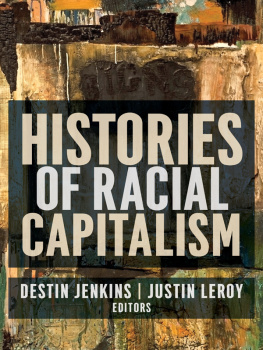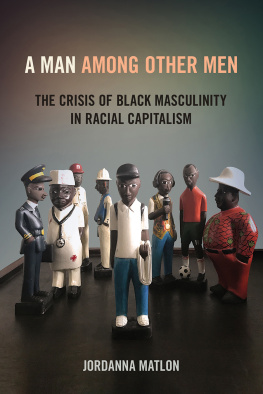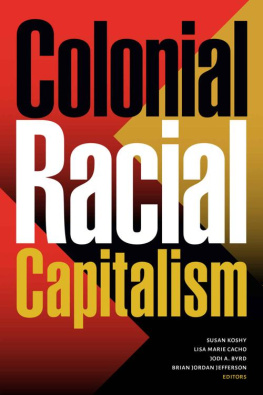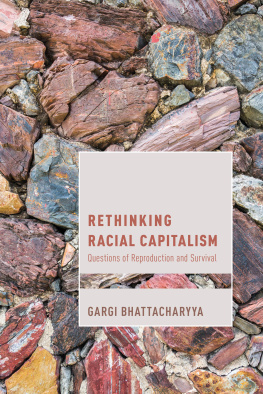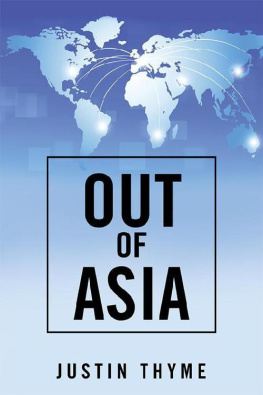Table of Contents
Histories of Racial Capitalism
Columbia Studies in the History of U.S. Capitalism
Columbia Studies in the History of U.S. Capitalism
Series Editors: Devin Fergus, Louis Hyman, Bethany Moreton, and Julia Ott
Capitalism has served as an engine of growth, a source of inequality, and a catalyst for conflict in American history. While remaking our material world, capitalisms myriad forms have alteredand been shaped byour most fundamental experiences of race, gender, sexuality, nation, and citizenship. This series takes the full measure of the complexity and significance of capitalism, placing it squarely back at the center of the American experience. By drawing insight and inspiration from a range of disciplines and alloying novel methods of social and cultural analysis with the traditions of labor and business history, our authors take history from the bottom up all the way to the top.
Capital of Capital: Money, Banking, and Power in New York City, 17842012, by Steven H. Jaffe and Jessica Lautin
From Head Shops to Whole Foods: The Rise and Fall of Activist Entrepreneurs, by Joshua Clark Davis
Creditworthy: A History of Consumer Surveillance and Financial Identity in America, by Josh Lauer
American Capitalism: New Histories, edited by Sven Beckert and Christine Desan
Buying Gay: How Physique Entrepreneurs Sparked a Movement, by David K. Johnson
City of Workers, City of Struggle: How Labor Movements Changed New York, edited by Joshua B. Freeman
Banking on Freedom: Black Women in U.S. Finance Before the New Deal, by Shennette Garrett-Scott
Threatening Property: Race, Class, and Campaigns to Legislate Jim Crow Neighborhoods, by Elizabeth A. Herbin-Triant
How the Suburbs Were Segregated: Developers and the Business of Exclusionary Housing, 18901960, by Paige Glotzer
Brain Magnet: Research Triangle Park and the Idea of the Idea Economy, by Alex Sayf Cummings
Histories
of Racial
Capitalism
Edited by Destin Jenkins and
Justin Leroy
Columbia University PressNew York
Columbia University Press
Publishers Since 1893
New YorkChichester, West Sussex
cup.columbia.edu
Copyright 2021 Columbia University Press
All rights reserved
E-ISBN 978-0-231-54910-3
Library of Congress Cataloging-in-Publication Data
Names: Jenkins, Destin, editor. | Leroy, Justin, editor.
Title: Histories of racial capitalism / edited by Destin Jenkins and Justin Leroy.
Description: New York : Columbia University Press, [2021] | Series: Columbia
studies in the history of U.S. capitalism | Includes bibliographical references
and index.
Identifiers: LCCN 2020024539 (print) | LCCN 2020024540 (ebook) |
ISBN 9780231190749 (hardback) | ISBN 9780231190756 (trade paperback) |
ISBN 9780231549103 (ebook)
Subjects: LCSH: United StatesEconomic conditions. | Capitalism
United StatesHistory. | RacismEconomic aspectsUnited States.
Classification: LCC HC103 .H58 2021 (print) | LCC HC103 (ebook) |
DDC 330.9730089dc23
LC record available at https://lccn.loc.gov/2020024539
LC ebook record available at https://lccn.loc.gov/2020024540
A Columbia University Press E-book.
CUP would be pleased to hear about your reading experience with this e-book at .
Printed in the United States of America
Cover image: Watts Riot, 1966, Noah Purifoy.
2020 Courtesy of Noah Purifoy Foundation
Cover design: Lisa Hamm
Contents
Angela P. Harris
Destin Jenkins and Justin Leroy
K-Sue Park
Shauna J. Sweeney
Mishal Khan
Allan E. S. Lumba
Manu Karuka
Justin Leroy
Destin Jenkins
Ryan Cecil Jobson
Pedro A. Regalado
FOREWORD
Racial Capitalism and Law
Angela P. Harris, University of CaliforniaDavis School of Law
A s the editors of this volume note, neither the racial nor the capitalism part of the term racial capitalism ought to be taken for granted. I admit: the term makes me nervous. I worry that using race as a keyword will increase the fraught divide between scholars of race and scholars of settler colonialism. I also worry that the rightful association of the term with the pathbreaking work of Cedric Robinson, W. E. B. Du Bois, and Eric Williams will solidify a masculinist canon. And I worry that the word capitalism will not only trigger for some scholars the everlasting debate about how to define that term but also foreclose the relevance of the project to noncapitalist and/or anticapitalist times and spaces. But in this essay, I wont dwell on worries. Instead, Ill argue that my discipline, law, is a key site for the development of new scholarship in racial capitalism, and that alliances among racial capitalism scholars in the humanities and social sciences and racial capitalism scholars in law have the potential to fruitfully disrupt some of the discourses that sustain neoliberal governance.
As this volume illustrates, an important strand of the new racial capitalism literature traces the historical role of white supremacy in the processes of dispossession, extraction, accumulation, and exploitation that are central to todays capitalism. The editors introduction articulates the bold premise of this work: Racial subjugation is not a special application of capitalist processes, but rather central to how capitalism operates.
The implications of this literature for legal studies are intriguing. Legal scholarship and teaching circulate simultaneously in the university and in the larger networks of the profession. Within the university, law interacts with many other disciplines, including those in the humanities and the social sciences. For example, critical race theory (CRT) emerged in the 1980s as a university-facing flow, drawing on critical legal studies and on Third World studies.
The fiefdom-defending capacities of economics extend to its offshoot in the legal academy, law-and-economics, which continues to hold sway over research and teaching in all the fields that touch markets, from business associations to securities regulation to intellectual property to contracts to international trade. Capitalism doesnt exist in these fields. There are only markets and economic analysis, abstract systems obeying rules that are elegant, timeless, and inherently disconnected from matters of distribution.
Lately, though, there has been a series of disturbances in the force. The shock of the Great Recession of 2008, the slow creep of climate change, and most recently the cascading assaults of the COVID-19 pandemic have all undermined the neoliberal political-economic consensus, as has the post-postracial rush of xenophobic and nationalist authoritarianism around the globe. In the context of these shocks, the emergence of racial capitalism in the tiny world of the academic humanities might actually be big. Traveling through the fissures and networks of legal studies and social movements in the way CRT has, racial capitalism has the potential to amplify the shock waves from within and without.
Part I of this essay argues that legal scholarship and teaching form an important bridge between academia and the doings of state and market governance. Part II imagines some moves that racial capitalism and legal studies, developing together, might make in these spaces and in progressive organizing for noncapitalist futures.



